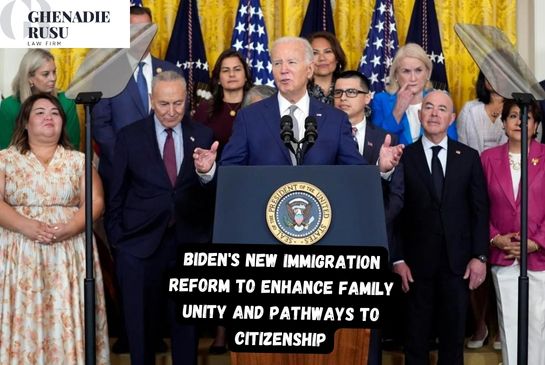Family-based immigration plays a crucial role in reuniting families and fostering togetherness. It allows eligible individuals to sponsor certain family members to immigrate to the United States. If you’re curious to learn more about this process and its significance, you’ve come to the right place.
Introduction
Imagine being separated from your loved ones for an extended period. The distance can be emotionally challenging and can impact family dynamics. Fortunately, family-based immigration provides a pathway for eligible individuals to bring their family members to the United States and build a life together. In this article, we’ll explore the intricacies of family-based immigration, the various categories involved, and the essential steps to embark on this journey.
Understanding Family-Based Immigration
Family-based immigration, also known as family reunification, is a process that allows U.S. citizens and lawful permanent residents (green card holders) to sponsor their family members to live and work in the United States. The primary goal is to promote family unity by providing opportunities for families to be together in the same country.
Family-based immigration has numerous benefits. Apart from bringing families together, it contributes to cultural diversity, enhances social cohesion, and strengthens community bonds. It also provides emotional and psychological support to individuals and helps create a sense of belonging.
Categories of Family-Based Immigration
Family-based immigration consists of two main categories: immediate relative category and family preference categories.
Immediate Relative Category
The immediate relative category is the most straightforward and expedited path within family-based immigration. It is reserved for immediate relatives of U.S. citizens and includes spouses, unmarried children under 21 years old, and parents of adult U.S. citizens. The immediate relative category has no numerical limitations, allowing eligible individuals to receive visas without being subject to visa backlogs.
To qualify as an immediate relative, the relationship must meet specific requirements. For example, a spouse must be legally married to the U.S. citizen, and the marriage must be recognized under U.S. immigration laws. Similarly, parents must demonstrate a bona fide parent-child relationship.
The process of obtaining an immediate relative visa involves filing a petition, submitting required documentation, and attending an interview at the U.S. embassy or consulate in the applicant’s home country.
Family Preference Categories
Apart from the immediate relative category, family-based immigration also includes family preference categories: F1, F2, F3, and F4. These categories have numerical limitations, and the number of available visas is limited each year.
The family preference categories accommodate a broader range of relationships, including unmarried adult children of U.S. citizens, spouses and unmarried children of green card holders, married adult children of U.S. citizens, and siblings of adult U.S. citizens.
Each family preference category has its own eligibility criteria and visa application process. The wait times for these categories can vary significantly due to the limited number of visas available and the demand from applicants.
Sponsorship and Affidavit of Support
In family-based immigration, the sponsoring individual, also known as the petitioner or sponsor, plays a crucial role in the process. The sponsor must be a U.S. citizen or lawful permanent resident and must meet specific requirements to qualify as a sponsor.
Sponsorship involves assuming financial responsibility for the sponsored immigrant. To demonstrate financial capability, the sponsor must submit an Affidavit of Support, a legally binding contract that ensures the sponsored immigrant will not become a public charge and will have adequate financial support in the United States.
The Affidavit of Support includes detailed information about the sponsor’s income, assets, and household size. It helps establish the sponsor’s ability to financially support the sponsored immigrant and prevents the immigrant from becoming a burden on public resources.
Waiting Times and Visa Backlogs
Visa backlogs are an essential consideration in family-based immigration. Due to the numerical limitations on certain categories, visa backlogs can result in significant waiting times for applicants. It’s important to understand the potential delays and manage expectations accordingly.
The waiting times can vary depending on the category and the country of origin of the applicant. Some categories may have shorter waiting times, while others may have much longer backlogs. For example, immediate relatives generally have shorter processing times, while certain family preference categories may have considerably longer waiting periods.
It’s crucial to stay informed about the visa bulletin, which provides monthly updates on the availability of visas for family-based immigration categories. The visa bulletin categorizes applicants based on their priority date, which is determined by the date the petition was filed.
Remember, visa backlogs are subject to change based on various factors, including government policies, annual visa quotas, and overall demand. Seeking legal advice and staying up to date with the latest information can help navigate these complexities.
Adjustment of Status vs. Consular Processing
When applying for family-based immigration, there are two primary methods to obtain an immigrant visa: adjustment of status and consular processing. The method chosen depends on several factors, including the applicant’s location and immigration status.
Adjustment of status is a process available to those who are already in the United States and meet certain eligibility criteria. It allows eligible applicants to apply for lawful permanent resident status (green card) without leaving the country. This process involves filing the necessary forms, attending biometrics appointments, and attending an interview with U.S. Citizenship and Immigration Services (USCIS).
Consular processing, on the other hand, is the method used when the applicant is outside the United States or ineligible for adjustment of status. Consular processing involves applying for an immigrant visa at a U.S. embassy or consulate in the applicant’s home country. It requires completing the required forms, submitting supporting documentation, attending an interview, and undergoing medical examinations.
Various factors, such as the applicant’s immigration status, travel history, and eligibility for adjustment of status, can influence the choice between adjustment of status and consular processing. Consulting with an immigration attorney can help determine the most suitable path.
Limitations and Restrictions
While family-based immigration provides opportunities for family reunification, it is important to be aware of certain limitations and restrictions that may apply.
Age-Out Protection
Age-out protection is a critical consideration in family-based immigration, especially for children who may age out during the immigration process. Generally, to be eligible as a child in family-based immigration, the individual must be unmarried and under 21 years old. However, the aging-out issue arises when a child turns 21 before the completion of the immigration process.
To address this concern, the Child Status Protection Act (CSPA) provides certain protections to prevent aged-out children from losing their eligibility entirely. The CSPA allows for the calculation of the applicant’s “adjusted age” by deducting the time the visa petition was pending from their biological age. This adjusted age helps determine if the applicant can still qualify as a child and continue the immigration process.
Same-Sex Marriage
Following the landmark Supreme Court decision in 2015, same-sex marriages are recognized under U.S. immigration laws. Therefore, U.S. citizens and lawful permanent residents in same-sex marriages can sponsor their spouses for family-based immigration, just like opposite-sex couples.
It’s important to note that the same eligibility requirements apply, and the process for same-sex couples is similar to that of opposite-sex couples. As long as the marriage is legally valid, same-sex couples have the same rights and privileges in family-based immigration.
Stepchildren
Family-based immigration also accommodates stepchildren. If a U.S. citizen or lawful permanent resident marries someone with children, the stepchildren can be included in the family-based immigration process. To qualify, the marriage between the sponsoring individual and the child’s parent must have occurred before the child turns 18.
It’s important to provide evidence of the bona fide parent-child relationship and follow the necessary procedures to ensure stepchildren are eligible for immigration benefits.
Conditional Residence
In certain cases, family-based immigrants may be granted conditional residence. Conditional residence is a temporary status that is subject to certain conditions and requires further action to obtain permanent residence.
Conditional residence typically applies in cases where the marriage between the sponsoring individual and the immigrant spouse is less than two years old at the time of obtaining the green card. To remove the conditions on residence, the couple must jointly file a petition to remove conditions within the 90-day window before the conditional green card expires.
The petition should demonstrate that the marriage is bona fide and not entered into solely for immigration purposes. The couple must provide evidence of their ongoing marital relationship and joint commitments, such as joint financial accounts, shared assets, and joint leases or mortgages.
Once the conditions are removed, the individual obtains permanent resident status without any further restrictions.
Path to Citizenship
Family-based immigration can potentially lead to U.S. citizenship for eligible individuals. While the initial immigrant visa grants lawful permanent residence (green card) status, it opens the door to eventually pursue citizenship through naturalization.
Naturalization is the process of becoming a U.S. citizen. It involves meeting specific requirements, such as residing in the United States for a certain period, demonstrating good moral character, passing an English and civics test, and taking the Oath of Allegiance.
After obtaining lawful permanent resident status through family-based immigration, individuals can generally apply for naturalization after residing in the United States for at least five years (or three years if married to a U.S. citizen). Naturalization provides numerous benefits, including the right to vote and the ability to sponsor additional family members for immigration.
Waivers and Humanitarian Considerations
In some family-based immigration cases, certain circumstances may require the applicant to seek waivers or consider humanitarian considerations.
Waivers are available for certain grounds of inadmissibility, such as previous immigration violations, criminal history, or health-related issues. These waivers provide an opportunity to overcome inadmissibility and proceed with the immigration process. Waivers require demonstrating extreme hardship to qualifying relatives, among other requirements.
Additionally, humanitarian considerations may come into play when dealing with exceptional circumstances or compelling needs. These considerations take into account factors such as medical conditions, personal safety, or other significant reasons that warrant humanitarian relief.
Navigating the waiver and humanitarian considerations process can be complex. Seeking legal guidance from an experienced immigration attorney is highly recommended to understand the options available and ensure a comprehensive approach.
Common Challenges and Pitfalls
Family-based immigration can present various challenges and pitfalls that applicants should be aware of to navigate the process successfully. Here are some common issues to keep in mind:
- Complex Documentation: The immigration process requires extensive documentation. It’s essential to gather and submit the required paperwork accurately and in a timely manner.
- Language Barriers: Language barriers can pose challenges during the application process. It’s important to seek assistance from translators or interpreters when necessary to ensure accurate communication.
- Navigating Visa Backlogs: Visa backlogs can lead to significant waiting times. Staying informed about the visa bulletin and seeking legal advice can help manage expectations and plan accordingly.
- Understanding Eligibility: Understanding eligibility criteria and which family-based immigration category applies can be confusing. Consulting with an immigration attorney can provide clarity and guidance.
- Navigating the Interview Process: Interviews are a crucial part of the immigration process. Preparing for the interview, understanding the expectations, and having all necessary documentation ready can help ensure a smooth experience.
By being aware of these challenges and pitfalls, applicants can approach family-based immigration with a better understanding of what to expect and how to overcome potential hurdles.
Working and Studying in the U.S.
Once family-based immigrants obtain lawful permanent residence (green card) status, they have the opportunity to work and study in the United States.
Working in the U.S. typically requires obtaining employment authorization, either through an employment-based visa or by adjusting status based on an employment offer. Family-based immigrants can apply for employment authorization, allowing them to work legally in the United States.
Similarly, family-based immigrants can pursue education in the U.S. They can apply to colleges, universities, and other educational institutions, and if accepted, they can obtain student visas to study in the United States.
It’s important to research and understand the specific requirements and processes for obtaining employment authorization or pursuing education based on individual circumstances.
Conclusion
Family-based immigration is a vital process that fosters family unity, promotes cultural diversity, and strengthens communities in the United States. By sponsoring eligible family members, individuals can bring their loved ones together, creating a sense of belonging and support.
Understanding the different categories, the sponsorship process, potential challenges, and the path to citizenship is essential for a successful family-based immigration journey. By staying informed, seeking legal guidance when needed, and being prepared for the process, individuals can navigate family-based immigration effectively and achieve their goal of reuniting with their loved ones in the United States.
Contact the Law Office of Ghenadie Rusu today to schedule a consultation and discuss your family-based immigration needs. Our attorneys are here to guide you through the process and help you build a brighter future with your loved ones in the United States.
Frequently Asked Questions (FAQs)
1. Can I sponsor a family member who is not a direct relative?
Yes, family-based immigration includes family preference categories that accommodate a broader range of relationships. These categories allow for the sponsorship of certain family members, such as adult children, siblings, and spouses of green card holders.
2. Can same-sex couples sponsor their spouses for family-based immigration?
Yes, following the Supreme Court decision in 2015, same-sex marriages are recognized under U.S. immigration laws. Same-sex couples have the same rights and privileges as opposite-sex couples in family-based immigration.
3. What is the difference between adjustment of status and consular processing?
Adjustment of status is the process used when the applicant is already in the United States and eligible to apply for a green card without leaving the country. Consular processing is used when the applicant is outside the United States or ineligible for adjustment of status, requiring the application to be processed through a U.S. embassy or consulate.
4. Are there any limitations or restrictions in family-based immigration?
Yes, there are certain limitations and restrictions to be aware of. These may include age-out protection for children who may age out during the immigration process, considerations for stepchildren, conditional residence for certain marriages, and potential grounds of inadmissibility that require waivers or humanitarian considerations.
5. How long does it take to become a U.S. citizen through family-based immigration?
The path to U.S. citizenship through family-based immigration involves obtaining lawful permanent resident status (green card) and meeting specific requirements for naturalization. Generally, individuals can apply for naturalization after residing in the United States for at least five years (or three years if married to a U.S. citizen). The naturalization process typically takes several months to complete.













